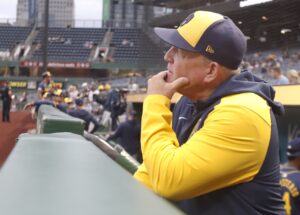While José Cruz did not start nor complete his career in a Houston Astros uniform, he made his most prominent impact on the MLB field while in Houston. From 1970 through 1978, Cruz not only secured his place within the pantheon of Astros greats on the field, he did so in the hearts of Astros fans. He worked his way to become one of the most popular players in Houston Astros team history. Cruz continues to have that hold with fans to this day. His status as leading the then-National League team to their first-ever division title and the 1980 postseason, plus his post-playing career position with the team, has made him an enduring figure in the hearts of Astros fans to this day.
José Cruz: Astros Hall of Famer
Starting in St. Louis
When Cruz graduated in 1966 from Arroyo High School in Puerto Rico, he immediately signed with the St. Louis Cardinals. While he toiled a few years in the minors, he got his call-up in September of 1970. The call-up resulted in six hits within his six games played. While he didn’t make the team out of spring training the following year, he was called back up in late June, and played 83 out of the next 85 games in center field. His stats, which included a .274 average, nine home runs, and a 49-to-35 walk-to-strikeout ratio, led to his starting in center the following Opening Day for the Cardinals. He muddled his way through, compiling average statistics for the next few seasons.
On to Houston
In 1974 Cruz received a boost to his career. On October 24, during post-season moves, his contract was sold to the Houston Astros. The move proved to be a boon for José. He would come out of Spring Training as the team’s Opening Day starting right fielder in 1975. José generated solid stats despite the team’s rough season. The Astros traded first baseman Lee May to the Baltimore Orioles during the offseason. This allowed Bob Watson, the Astros’ left fielder, to move to first base, which would open the position to either Cruz or his teammate Greg Gross.
By the end of the 1976 season, however, the Cruz-Gross competition was over. Cruz secured the left field position and would go on to secure confidence in a substitute role in right field as well for the 1977 and 1978 seasons. The 1980 season propelled Cruz to the forefront of fans’ attention.
Jose Cruz, circa 1979 @astros pic.twitter.com/ItdtX84VHb
— Vintage Jerseys & Hats (@PolyesterUnis) March 3, 2024
Breaking Out
The 1980 season proved to be the breakout season for José Cruz. By that point, outside of the late Pittsburgh Pirate, Roberto Clemente, he was likely the most famous player coming out of Puerto Rico during his career. Missing only a couple of games that year, Jose would slash .302/.360/.426 over 160 games and earn a spot in the All-Star Game, his first. Additionally, Cruz would help elevate the Astros to the postseason by defeating the Los Angeles Dodgers in a one-game tiebreaker. Their season ended in hard-fought NLCS against the Philadelphia Phillies, who would defeat the Astros and go on to win the World Series against the Kansas City Royals. For his part, Cruz battled the Phillies throughout, hitting for a .400 average during the series and tacking on four RBI, six hits, eight walks, and only one strikeout.
Cruz would go on to play a pivotal role in taking the Astros to the National League Division Series the following year. While it was a strike-shortened season, Cruz’s play helped the Astros win the second half of the year, advancing to face the Dodgers once again, before losing the series. In 1984, Cruz would win his second, and final, Silver Slugger Award with a .312 average.
Two seasons later, the Astros would return to the postseason. Unfortunately, his production was down, and the Astros didn’t advance any farther; in 1988, Cruz found himself in New York’s pinstripes. He would only play for another 38 games with the Yankees before his release on July 22, after which he ended his career. Cruz had a hand in the Astros’ first nine postseason appearances as a player or coach. He did so as a player in 1980, 1981, and again in 1986.
Post-Playing Days and Career Accolades
Cruz would return to the team that brought him to the forefront of baseball, the Astros, as a coach. In that role, Cruz would play a role in helping the Astros make it to six postseason appearances: 1997-1999, 2001, and again in 2004 and 2005). His collected accolades include an All-Star appearance in 1980 in Los Angeles and another All-Star appearance in Minnesota in 1985. He finished in the top ten of MVP voting in 1980, 1983, and 1984, while winning back-to-back NL Silver Slugger Awards as an outfielder in 1983 and 1984.
As a coach, Cruz would man the first base box. At that point he had posted more games than any other player in franchise history with 1,870, He stood there watching his heir apparent Craig Biggio surpass numerous team records Cruz held or established, including at-bats, total bases, and hits. Still, Cruz holds the Astros record with 80 triples as well as walk-off home runs with six.
While the Astros never denied José Cruz his place in the Astros’ legacy; the team made it official on October 3, 1992. Before the game, the Astros retired Cruz’s number 25. At the same time, his teammate on the mound during those glory days, pitcher Mike Scott, had his number 33 retired as well.
Astros Legend
Since that time, Cruz has picked up several other accolades. He earned induction to the Texas Baseball Hall of Fame in 2003 and ranked 18th among St. Louis Cardinals players in wins above replacement in 2018 (of players who spent at least five seasons with the team). This placed him ahead of Hall of Fame players Lou Brock, Dizzy Dean, and Ted Simmons. A few years later, he was inducted into the Hispanic Heritage Baseball Museum Hall of Fame in 2002 during a Minute Maid Park on-field ceremony. Finally, pulling that all together, Cruz was inducted as part of the inaugural class of the Astros Hall of Fame in August 2019. If you attend an Astros game this season, don’t be surprised if you run into José Cruz, as he remains a primary figure in the Astros organization.
Photo Credit: © Troy Taormina-USA TODAY Sports






